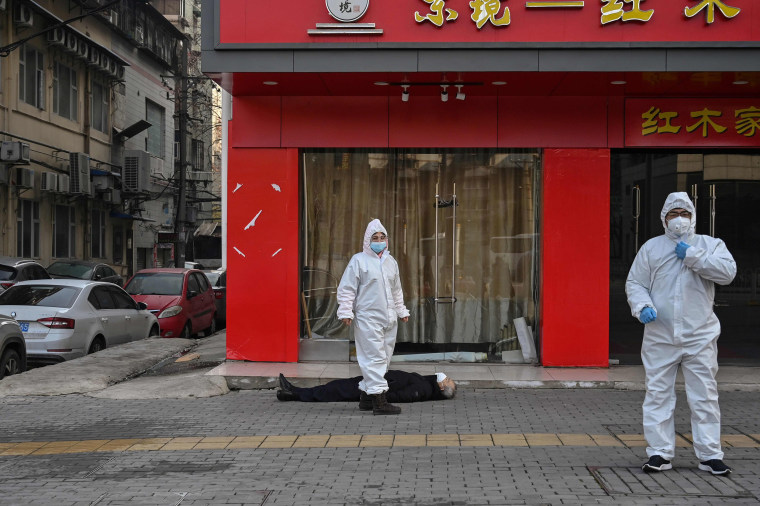China refuses co-operation with Wuhan Pox investigation--will the WHO do a cover-up
"Unlikely" that Covid came from Wuhan lab, WHO says
Dr. Peter Ben Embarek from the World Health Organization said it was more likely that the virus, which has now claimed more than 2.3 million lives worldwide, had jumped to humans from an animal.
“Our initial findings suggest that the introduction through an intermediary host species is the most likely pathway and one that will require more studies and more specific targeted research,” he said at a press conference.
The theory that the virus was introduced into the human population as a result of a lab accident did not warrant future study, he added.
There was speculation early on in the pandemic — partially fueled by then-President Donald Trump — that the virus was either manufactured at or accidentally leaked from a lab at the Wuhan Institute of Virology, which has been involved in coronavirus research. But this theory has been largely dismissed by the global scientific community and Chinese researchers working at the lab.
Speaking alongside Embarek, the head of the Covid-19 panel at China's National Health Commission and the Chinese lead on the international team of experts, Dr. Liang Wannian, said early data suggested that the coronavirus could have been circulating for weeks before it was identified in Wuhan.
"This indicates the possibility of the missed reported circulation in other regions," Liang said, adding that there was no evidence to suggest the virus was spreading in Wuhan before December 2019 — when the first cases of the pneumonia-like illness were reported in the city of some 11 million people.
Download the NBC News app for the latest news on the coronavirus
The Covid-19 pandemic became a geopolitical battleground for China and the Trump administration, with Trump routinely referring to Covid-19 as "the China virus" and accusing Beijing of misinformation. China had strongly criticized what it called an attempt to politicize the pandemic and denied allegations of a cover-up.
So far, the Biden administration is refraining from judgment until the United States directly receives the World Health Organization report on their findings, State Department spokesperson Ned Price said Tuesday.
“Rather than rush to conclusions that may be motivated by anything other than the science, we want to see where that data leaves us, and based on that, we'll come to a conclusion,” Price said.
China has faced heavy criticism for allegedly downplaying the severity of the initial outbreak of the mysterious, pneumonia-like illness in late 2019, and for not acting quickly enough to alert the WHO of evidence of human-to-human transmission.
Suspicion about China’s handling of the outbreak came after its problematic response to the 2003 SARS pandemic, when it was found that Chinese officials had suppressed and deliberately withheld information from the public. The WHO praised China early for its efforts to contain the Covid-19 outbreak, but questions still remain about where and how the pathogen emerged.
Embarek said ongoing work into the origin of the virus points to bats as a possible natural reservoir for Covid-19, but since Wuhan is not a natural environment for the animal it remains unclear how the virus was introduced into the city.
Beijing has been keen to promote the idea that Wuhan was just the first city to raise the alarm about the new virus and was not responsible for the outbreak. It has previously suggested the virus could have been imported into the country with frozen food products.
Both Liang and Embarek said Tuesday transmission of Covid-19 through frozen products was a possibility that requires further research.
China has faced heavy criticism for allegedly downplaying the severity of the initial outbreak of the mysterious, pneumonia-like illness in late 2019, and for not acting quickly enough to alert the WHO of evidence of human-to-human transmission.
Suspicion about China’s handling of the outbreak came after its problematic response to the 2003 SARS pandemic, when it was found that Chinese officials had suppressed and deliberately withheld information from the public. The WHO praised China early for its efforts to contain the Covid-19 outbreak, but questions still remain about where and how the pathogen emerged.
Embarek said ongoing work into the origin of the virus points to bats as a possible natural reservoir for Covid-19, but since Wuhan is not a natural environment for the animal it remains unclear how the virus was introduced into the city.
Beijing has been keen to promote the idea that Wuhan was just the first city to raise the alarm about the new virus and was not responsible for the outbreak. It has previously suggested the virus could have been imported into the country with frozen food products.
Both Liang and Embarek said Tuesday transmission of Covid-19 through frozen products was a possibility that requires further research.

The WHO's team landed in Wuhan last month, more than a year after Covid-19 was first detected there. The long-awaited visit is part of what will be a lengthy process of piecing together the virus’s origin to answer key questions about the pathogen and how to prevent similar — and possibly worse — future outbreaks.
Team members said they have visited key sites such as the Huanan seafood market, which was linked to an early cluster of infections, as well as the Wuhan Institute of Virology.
Last week, a member of the team said the Chinese side granted full access to all sites and personnel they requested — a level of openness that even he hadn’t expected, The Associated Press reported.
No comments:
Post a Comment
Comments always welcome!